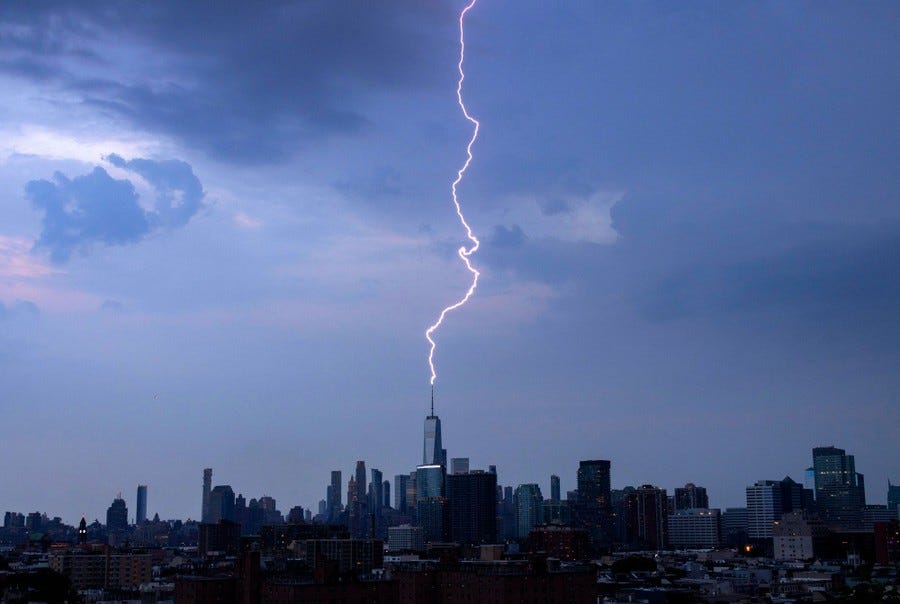The Top 5: Teen civics, rural voters, COVID nostalgia, faceless accounts, fentanyl on Snapchat
Welcome to the latest edition of the Top 5 articles we’ve read this week. Each week, we read dozens of articles in the hope we find essays and reporting that speak to big ideas, trends, future looks, and incredible human stories. We hope you enjoy these articles, and do always let us know if you have a suggestion or a recommendation!
Before we get to the top five, we’d encourage you to checkout Michael’s new longform essay in the respected journal National Affairs that draws on the second chapter of The Spirit of Our Politics on “the disappearance of moral knowledge.
Please consider becoming a paid subscriber if this is one of those newsletters you open up all the time or look forward to each week. We couldn’t do this work without our paying subscribers and encourage you to make the switch from free to paid. We have a student/educator discount as well!
The Spirit of Our Politics: Spiritual Formation and the Renovation of Public Life is available now! If you already own the book, access CCPL’s discussion guide here. Would you also consider writing a review on Amazon? Thank you for your support!
The Top 5 articles for your week:
“Can a civics teacher persuade her students to believe in democracy?” (WaPo)
Because Greg Jaffe dives deep into the efforts of a high school civics teacher in Allentown, PA who is trying to convince her Senior students to vote for the first time this fall.
Their memories of politics began with the bitter 2016 presidential election between Donald Trump and Hillary Clinton and included the U.S. Capitol riot two months after the November 2020 election.
To these students, American politics was an ego-driven, aimless mess. Adding younger, less-mature voices to the toxic mix would only produce more chaos and disappointment, they said. After class, a few of the students congregated around Salter’s desk, continuing the argument until Salter realized that they were running late for their third-period classes. She shooed them on. Salter hadn’t changed any minds, not yet. But she still had more than a month to go before the end of the term to convince her students that their participation in American democracy was worth it. She had no idea how hard a sell that would turn out to be.
“How ‘Rural Studies’ Is Thinking About the Heartland” (NYT)
Because Emma Goldberg looks at political science and the recent interest in measuring and classifying rural voters.
Maybe because so few people fashioned themselves as “rural political experts” until recently, the few high-profile explanations for the rise of rural Republicanism were widely embraced by the chattering classes.
“Inside Snapchat’s Teen Opioid Crisis” (Rolling Stone)
Because Paul Solotaroff investigates the accounts on Snapchat where young people can inadvertently purchase drugs like fentanyl and how law enforcement are looking into overdose trends.
Between 2019 and 2021, the number of teen deaths from fentanyl tripled — and the driver of that plague, per the cops and feds I talked to, was fake pills sold online. Phony opioids that looked like Oxycontins but were cut with fentanyl, not oxycodone; bogus Xanax but with fentanyl, not alprazolam, on board…and it was instantly available via social media and delivered to your door like Papa John’s. The folks compounding those pills weren’t pharm-school grads. They were cartel adjuncts or lost-soul dropouts with a storage unit and a pill press. And whether their fentanyl came from Mexico or directly from China, they were everywhere and nowhere at once: invisible on the street but ubiquitous online; and many were hawking poison disguised as pharma drugs over Snapchat.
“You Can't See Me, But I Can Make You Rich” (Trying in Public)
Because Lexi Merritt writes about “faceless accounts” on Instagram and how they’ve impacted social media marketing.
If we choose to see these accounts for what they are, small businesses, then it makes some sense that they might use stock images and videos…I guess my question, then, is what ideal is really being sold? Does a busy, overwhelmed mother who doesn't have time to get "camera ready" but desperately wants to make more money to support her family relate to the video of the 20-something twirling in front of the Eiffel Tower? Or is she instead being sold a dream, an ideal, a projection of what and who she is supposed to be? What's more, is she being sold that dream by someone who's ever even come close to actually living it?
“Lockdown Nostalgia” (Wisdom of Crowds)
Because Tara Isabella Burton reflects on missing COVID lockdowns and the rhythms and practices it afforded.
The life I led from, roughly, March 2020 to early 2022 was, perhaps the least content-worthy life I’d ever lived. Certainly, it was the smallest, in terms of scale and scope. The tasks that concerned me most were the ones in front of me: Getting fed, staying sane.
ICYMI on The Morning Five and CCPL’s new podcast For the Good of the Public:
The Morning Five: June 25, 2024
The Morning Five: June 26, 2024




